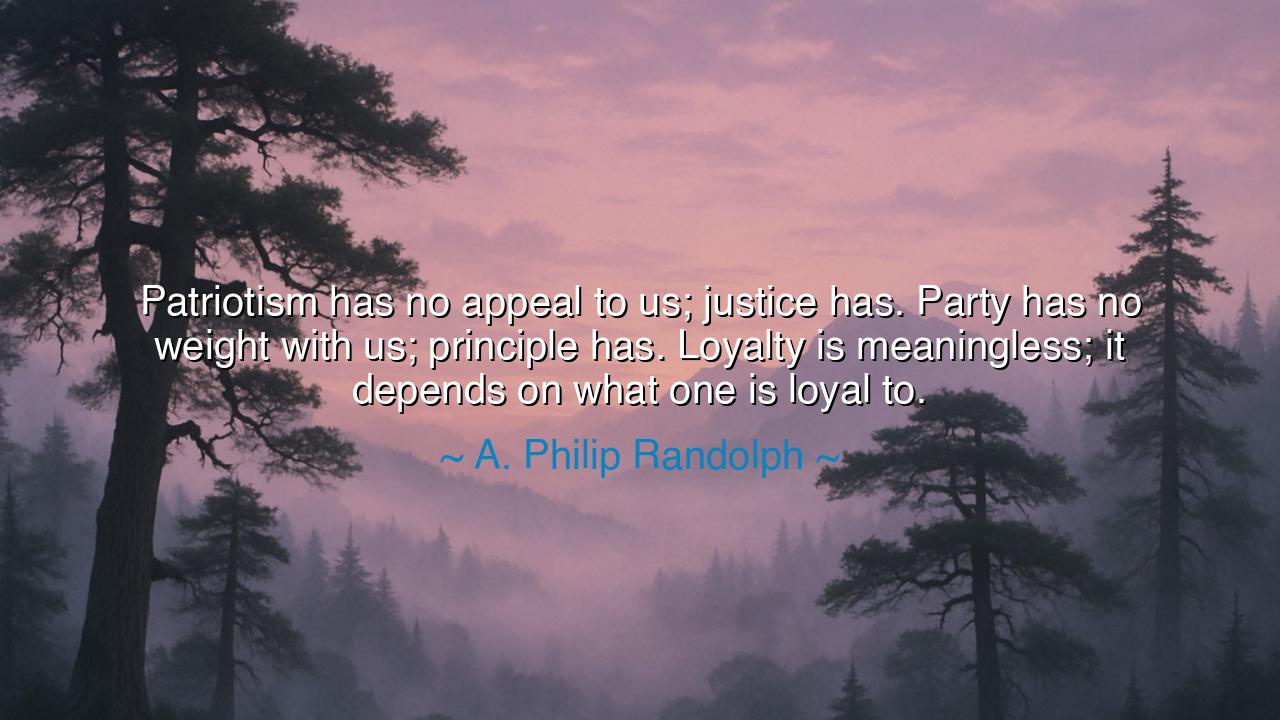
Patriotism has no appeal to us; justice has. Party has no weight
Patriotism has no appeal to us; justice has. Party has no weight with us; principle has. Loyalty is meaningless; it depends on what one is loyal to.






The words of A. Philip Randolph—“Patriotism has no appeal to us; justice has. Party has no weight with us; principle has. Loyalty is meaningless; it depends on what one is loyal to.”—fall like the hammer of a prophet striking stone. In them is revealed the wisdom of a man who knew the cost of compromise and the power of truth. Randolph, the great labor leader and civil rights pioneer, spoke for those who could not be dazzled by empty symbols or partisan banners. He reminded his generation, and ours, that the highest devotion is not to flag, party, or leader, but to justice, principle, and the righteousness of the cause.
At the heart of his teaching is the distinction between appearance and substance. Patriotism, if defined only as pride in country, can be invoked to justify any policy, even oppression. But justice cannot be so twisted. Party can rise and fall, its name changing with the winds of power, but principle endures across ages. Loyalty may bind a person to a tyrant as easily as to a saint, unless it is rooted in truth. Randolph’s words strip away the false idols of politics, leaving only the enduring core: fidelity to what is right.
His life bore witness to this creed. In the 1940s, Randolph threatened to lead a march of Black workers on Washington unless the government desegregated the defense industry. At a time when leaders invoked patriotism to demand unity in war, Randolph demanded justice instead. His unyielding stand forced President Roosevelt to issue Executive Order 8802, banning discrimination in defense jobs. Here, Randolph proved that devotion to principle can reshape the nation more powerfully than blind loyalty to flag or party.
History offers other echoes. Consider the abolitionists of the 19th century. Many were accused of being unpatriotic, for they denounced a Union that permitted slavery. Yet they knew that justice outweighed false patriotism, and their devotion to principle eventually brought forth emancipation. Their example, like Randolph’s, proves that loyalty without righteousness is worthless, but fidelity to principle can redeem an entire nation.
The ancients, too, spoke of this wisdom. Socrates, accused of disloyalty to Athens, declared that his highest allegiance was to truth and to the divine law, not to the whims of the city. He chose death rather than betray principle, and by his choice, he gave the world a lesson more enduring than all the decrees of his judges. In this way, Randolph stands in the same tradition: he reminds us that devotion to justice is the highest form of patriotism, for it seeks to purify and perfect the nation rather than excuse its flaws.
The lesson for us is both demanding and liberating. Do not be swayed by calls to loyalty when the cause is unjust. Do not cling to party when it betrays principle. Do not worship patriotism when it is used to cover oppression. Instead, anchor your soul in justice, walk steadfastly in principle, and give your loyalty only to that which uplifts the dignity of humanity. In this way, you honor not only your country but the greater law that stands above all nations.
In daily life, this means speaking truth even when unpopular, resisting injustice even when it is cloaked in national pride, and placing moral principle above partisan gain. It means asking, before offering loyalty: “To what, and to whom, am I loyal? Does this path serve justice, or does it betray it?” To live so is to follow Randolph’s teaching, to be a citizen not of factions or appearances, but of truth.
Thus let his words echo like a command across generations: patriotism without justice is hollow, party without principle is dust, loyalty without righteousness is corruption. But when justice, principle, and true loyalty align, they form the bedrock upon which a people can stand unshaken. Let us then be such people, devoted not to names or symbols, but to the eternal light of truth and justice.






AAdministratorAdministrator
Welcome, honored guests. Please leave a comment, we will respond soon